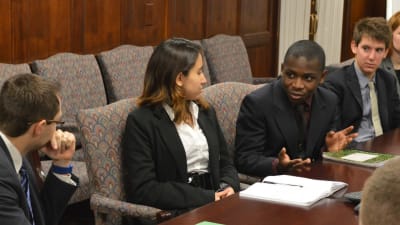Fall 2014 presents policy document on China-U.S. Trade War at Commerce Department
The capstone collaborative policy document is one of SEGL’s most challenging and meaningful assignments. Each semester cohort must choose a topic, research that topic and prepare a 40-page scholarly document, and then present and defend the document’s recommendations before real-world leaders. All in about three weeks while also continuing with regular classes.
It’s really fun, actually.
This semester the China-U.S. trade war (in particular, the role of renewable energy in that war) defeated ISIS to become Fall 2014’s policy document choice. After making this decision, the students split into six groups, each of which focused on a different aspect of the paper: History/Current Status, the U.S. Trade Representative, the U.S. Commerce Department, the U.S. Energy Department, the U.S. State Department, and the U.S. Congress.
The groups then spent a day in the George Washington University main library with full access to the University’s resources. David Ettinger, a top research librarian at GW who has become a student favorite since our first semester, starts with an entertaining orientation session so that the students know how to use the myriad databases in the GW system, and then the students are off to the many corners of the building.
After compiling their research for several days, the students appear before the notorious “Review Panel” (ask a current student or graduate what the unofficial name for this is), a faculty firing line that blisters the students with tough questions designed to ensure their research is consistent, logical, and well-sourced. (This proves especially useful when the students later present to high-ranking officials.)
The next step is rough drafts (each read by two faculty members), revisions, and additional research. This additional research often includes personal interviews with experts.
And then, before we know it, it is time to present. Each semester we try to meet with on-the-ground policymakers who have the ability to incorporate our students’ ideas into actual policy.
This semester we went to the Department of Commerce to meet with Ryan Mulholland, the Department’s Senior Renewable Energy Trade Specialist. Among other distinctions, Mulholland manages the Secretary of Commerce Penny Pritzker’s Renewable Energy and Energy Efficiency Advisory Committee and won the Department’s Gold Medal (its highest award) for his work on wind turbines in China. (Put simply: given our students’ interest, there isn’t a more important person working in government!)
Mulholland led a collegial, in-depth discussion, asking detailed and penetrating questions of the students and commending them for their preparation and presentation. Several of the students’ recommendations even earned serious consideration. Indeed, the meeting felt for all the world like a conversation between informed policy wonks, with substantive comments and questions traded on both sides. It was a fitting end to a meaningful and challenging project.
Want to see the document for yourself? You can download it here.










